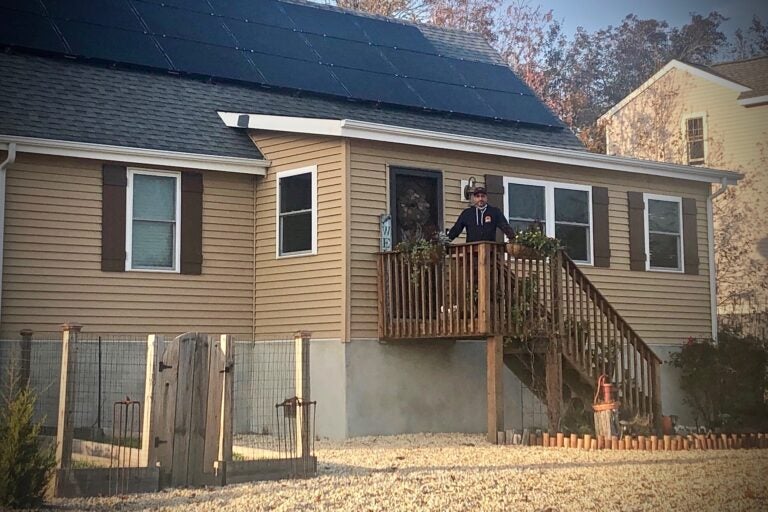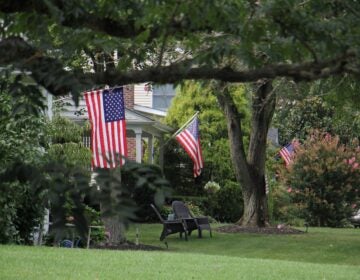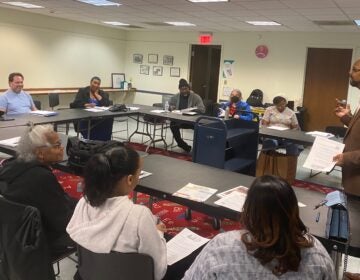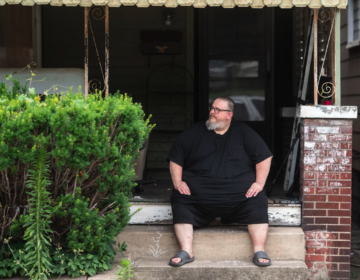Skipped mortgage payments brought relief to N.J. homeowners, but for some the help is running out
The mortgage forbearance program allows homeowners to skip payments for 90 days, but some are told they have to pay up in a lump sum.
Listen 4:23
Joe Mangino stands on the porch of his home in Beach Haven West, New Jersey. (Courtesy of Joe Mangino)
When Joe Mangino got laid off from his job in the spring, he could no longer afford his mortgage payments.
The Beach Haven West resident signed up for a state program that let him skip his mortgage payments for 90 days due to the pandemic. Although the program was voluntary for banks, Mangino’s lender was among more than 150 institutions that participated.
But after his 90 days were up, Mangino got bad news: his bank wanted the three months worth of payments in a lump sum right away.
“I don’t know why they would expect anybody to come up with $5,000, $6,000, $7,000, $8,000 in a lump sum when for the past 90 days they haven’t been able to make their basic mortgage payment,” Mangino said. “I just don’t understand the logic behind it. It’s not helping anybody.”
New Jersey’s mortgage forbearance program was a lifeline for many homeowners struggling to pay their bills during the economic crisis brought on by the pandemic, but critics say it has its drawbacks.
First of all, the program was voluntary, and some lenders didn’t participate. For those banks that did, there was no obligation that they extend the forbearance beyond 90 days at a borrower’s request.
Now, housing advocates say there is little in the way of a safety net to catch homeowners who are falling into a ruinous financial spiral due to the coronavirus.
“When there are homeowners who are unable to pay their bills, it is bad for everyone,” said Staci Berger, president and CEO of the Housing and Community Development Network of New Jersey.
Although no homeowners facing foreclosure can be kicked out during the pandemic, many still want to make good on their payments to avoid trouble later on, she said.
Berger called on the state government and banks to come up with a plan for people who cannot pay their mortgages, and endorse a bill in the legislature that would bar banks from requiring lump sum payments after a period of mortgage forbearance.
The legislation (S-2340/A-4034) would let homeowners who received mortgage forbearance during the pandemic repay those months at the end of their loan by tacking on extra months of payments then.
“We need to make sure that we’re putting people at the front and center of the decisions that we’re making, and ask the banks to come up with a way to write that loss off or figure out how to work with those homeowners to make sure that they’re able to pay those bills,” Berger said.
Housing advocates say this so-called “back-ending” of owed mortgage payments is a commonsense solution, but some in the banking industry disagree.
“You cannot force the small banks to back-end the mortgage payments,” said Michael Affuso, vice president of the New Jersey Bankers Association. “You have to allow them to work it out over a reasonable period of time.”
Banks need income such as mortgage payments to be able to pay customers who want to make withdrawals. For small banks with far less cash on hand than, for example, Bank of America or Citibank, those missed mortgage payments could mean the banks cannot meet their other obligations, Affuso said.
“If you have a concentration of borrowers who are not making payments, and you have a concentration of depositors that wish to withdraw their deposits, you create a liquidity risk.”
Affuso said he would rather see the solution given to renters in the bill also applied to homeowners, which is that they get six months to pay back every month of missed mortgage payments.
The New Jersey Assembly passed the legislation in July, but it has yet to go up for a vote in the Senate.
The Department of Human Services opened a $12 million rental-and-mortgage assistance program in early October, but it closed days later after the state received a “substantial” amount of applications. The state also offered an emergency grant program for small landlords.
The CARES Act gave homeowners whose mortgages were backed by the federal government — such as Fannie Mae and Freddie Mac — up to 360 days of forbearance.
Affuso encouraged borrowers struggling to make payments to reach out to their lender, as many banks are working with borrowers on payment plans rather than asking them for a pricey lump sum.
Joe Mangino got lucky.
First, he got his job back. Then, his lender said it would allow him to defer the three missed mortgage payments to the end of his loan, rather than pay it all in one lump sum.
“It’s great. Now it’s a big relief,” Mangino said.
But it doesn’t mean he’s out of the woods.
“Now I can start stashing money, because I’m also fearful that we’re going to have a second wave and God forbid we get laid off again.”

Get daily updates from WHYY News!
WHYY is your source for fact-based, in-depth journalism and information. As a nonprofit organization, we rely on financial support from readers like you. Please give today.



![CoronavirusPandemic_1024x512[1]](https://whyy.org/wp-content/uploads/2020/03/CoronavirusPandemic_1024x5121-300x150.jpg)


